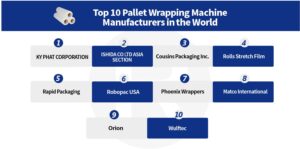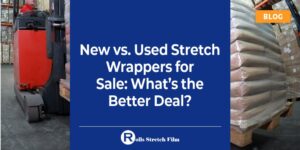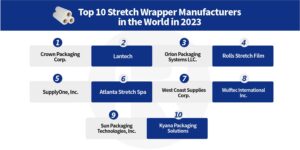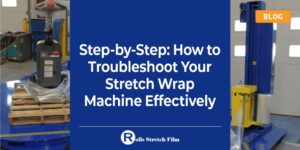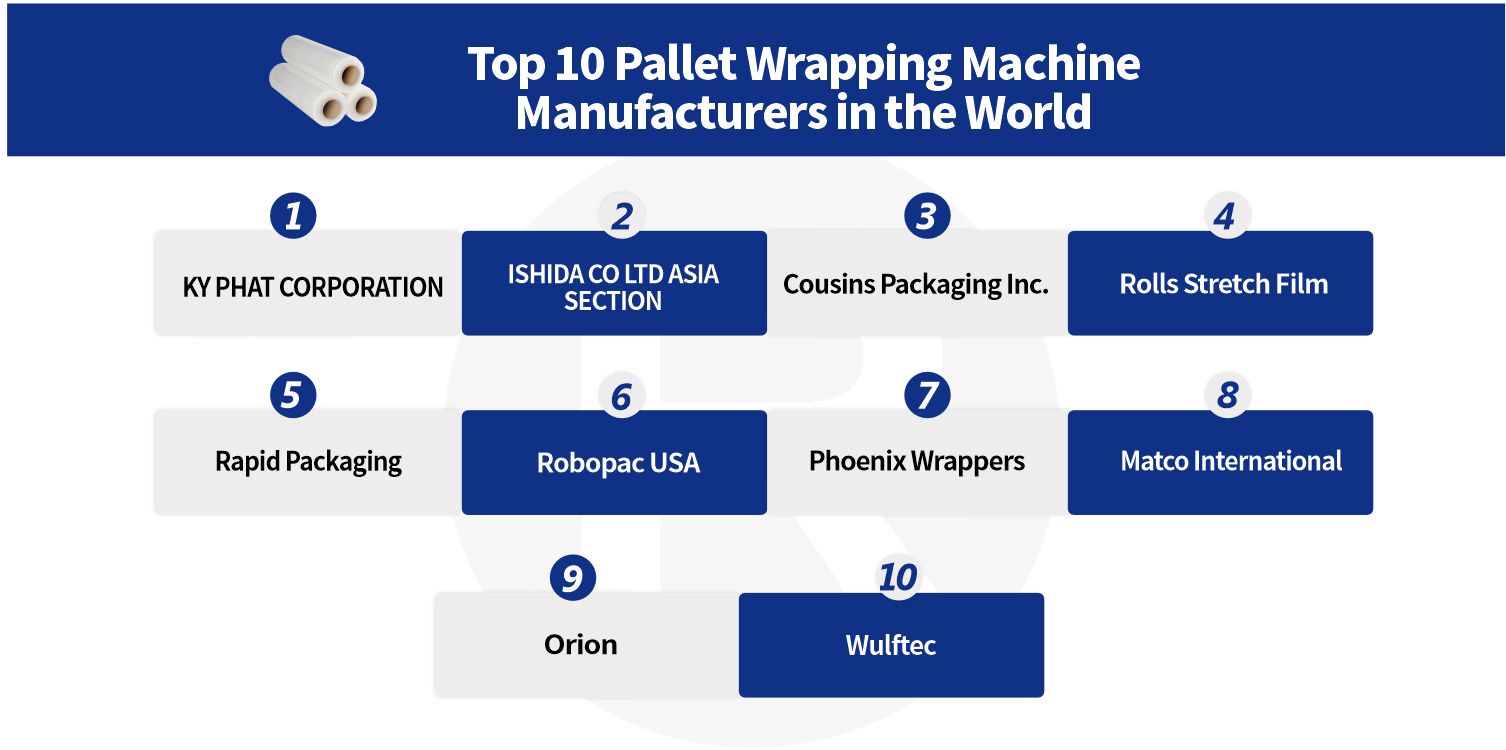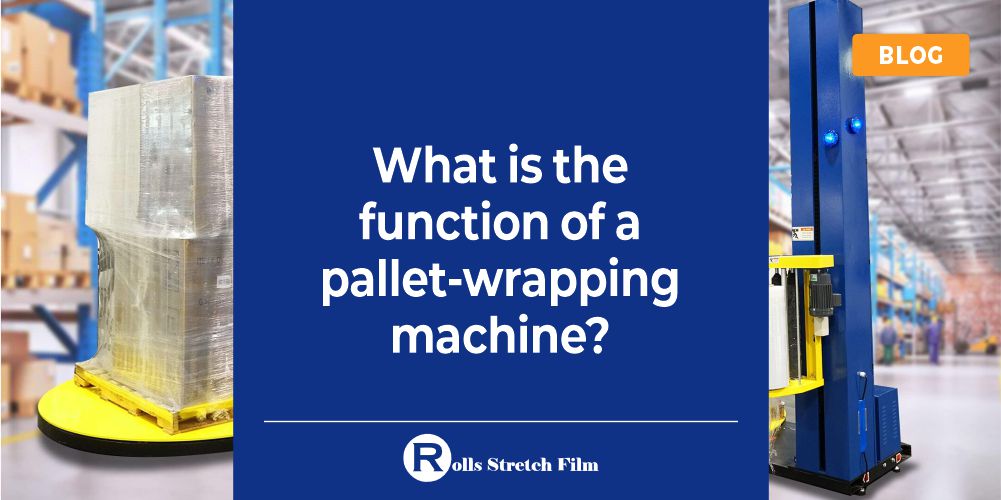Stretch film is a versatile material that is used to wrap products, pallets, and more for safe and secure transportation. With so many different types of stretch film available, it can be challenging to know which one to choose. That’s why we’ve put together a list of the top 10 types of stretch film you need for secure and efficient packaging.
The top 10 stretch films are machine, hand, extended core, bundling, UVI, vented, colored, pre-stretched, netting, and anti-static stretch film. By selecting the appropriate stretch film, you can minimize damage to your products during transportation and streamline your packaging process.
From machine to anti-static films, each type has its unique features and benefits that can help you streamline your packaging process while keeping your products safe during transit.

1. Introduction
A. Importance of Stretch Film in Packaging
The stretch film plays a critical role in packaging by providing a secure and efficient way to wrap and protect products during transportation. This versatile material is made of polyethylene and is stretchable, making it ideal for wrapping products of all shapes and sizes.
The stretch film provides several benefits for packaging, including enhanced product protection, reduced material waste, and increased efficiency in the packaging process. The film’s stretchability allows it to conform to the shape of the product, providing a tight, secure fit that minimizes the risk of damage during transportation.
B. Benefits of using the right Stretch Film
Using the right stretch film for packaging offers numerous benefits, including improved product protection, increased efficiency, and reduced material waste. The proper stretch film can prevent product damage by providing a secure and tight fit around the product, reducing the risk of scratches, dents, or other types of damage during transportation.
Additionally, using the correct stretch film can improve packaging efficiency by reducing the number of wraps needed to secure a product, saving time and effort during the packaging process. The right stretch film can also minimize material waste by using the optimal amount of film needed to wrap a product, reducing the overall amount of waste generated.
Furthermore, using the right stretch film can enhance a company’s sustainability efforts by reducing the use of unnecessary materials and promoting a more eco-friendly approach to packaging.
2. Types of Stretch Film
| Stretch Film Type | Advantages | Disadvantages | Application | Standard Size | Customizable |
|---|---|---|---|---|---|
| Machine Stretch Film | Suitable for machine wrapping, fast speed, high efficiency, low cost, good safety, stable load | Requires a stretch wrapper, not suitable for manual wrapping | Suitable for medium to high volume packaging operations, such as industrial products, food, beverages, etc. | Various thicknesses and widths are available, such as 12-35 microns, 250-500 mm | Different colors, adhesion, UV resistance and other characteristics can be customized |
| Hand Stretch Film | Suitable for manual wrapping, simple operation, high flexibility, no need for a stretch wrapper | Slow speed, low efficiency, high cost, poor safety, unstable load | Suitable for low volume packaging operations, such as home, small factory, etc. | Various thicknesses and widths are available, such as 12-35 microns, 250-500 mm | Different colors, adhesion, UV resistance and other characteristics can be customized |
| Extended Core Stretch Film | Has an extended core that can be used as a handle for easy manual wrapping | Heavier and more expensive than regular hand stretch film | Suitable for situations that require fast wrapping, such as warehouse, transportation, etc. | Various thicknesses and widths are available, such as 12-35 microns, 250-500 mm | Different colors and adhesion can be customized |
| Bundling Stretch Film | Has strong tensile and shrinkage force, can bundle small items or fix items on boxes | Narrower and thinner than regular hand stretch film | Suitable for bundling loose items or increasing the stability of items on boxes | Various thicknesses and widths are available, such as 5-10 microns, 50-100 mm | Different colors and adhesion can be customized |
| UVI Stretch Film | Has UV inhibitors that can prevent the wrapped items from being damaged or discolored by sunlight | More expensive than regular stretch film | Suitable for items that need to be stored or transported outdoors | Various thicknesses and widths are available, such as 12-35 microns, 250-500 mm | Different colors and adhesion can be customized |
| Vented Stretch Film | Has micro or macro holes, can provide ventilation and breathability, prevent mold and condensation | More expensive and easier to damage than regular stretch film | Suitable for items that need ventilation, such as agricultural products, frozen food, beverages, etc. | Various thicknesses and widths are available, such as 12-35 microns, 250-500 mm | Different colors and adhesion can be customized |
| Colored Stretch Film | Has different colors, can be used to distinguish or hide the wrapped items | More expensive and less transparent than regular stretch film | Suitable for items that need identification or confidentiality, such as chemicals, drugs, sensitive documents, etc. | Various thicknesses and widths are available, such as 12-35 microns, 250-500 mm | Different colors and adhesion can be customized |
| Pre-Stretched Film | Stretched to near breaking point during production and then rolled onto cores for sale | No need to stretch again when using, saving material and labor | Stretching and shrinking force is weak, not suitable for heavy or irregular loads | Suitable for most applications that require less material use and less operator fatigue | Various thicknesses and widths are available, such as 37-51 microns, 250-500 mm |
| Netting Stretch Film | Has net-like structure, can provide ventilation and breathability, prevent mold and condensation | More expensive and easier to damage than regular stretch film | Suitable for items that need ventilation, such as agricultural products, frozen food, beverages, etc. | Various thicknesses and widths are available, such as 12-35 microns, 250-500 mm | Different colors and adhesion can be customized |
| Anti-Static Stretch Film | Has anti-static additives, can prevent static electricity from damaging or attracting dust to the wrapped items | More expensive than regular stretch film | Suitable for items that are sensitive to static electricity, such as electronics, computer parts, etc. | Various thicknesses and widths are available, such as 12-35 microns, 250-500 mm | Different colors and adhesion can be customized |
Machine Stretch Film
Machine stretch film is a type of stretch film that is designed for use with automatic stretch wrapping machines. This type of film is typically larger in size and thickness than hand-stretch film, and it is applied using a machine that stretches the film to provide a secure and tight fit around the product.
Machine stretch film is commonly used in industries such as food and beverage, retail, and manufacturing, where efficient and secure packaging is essential for protecting products and reducing damage.
Hand Stretch Film
Hand stretch film is a type of stretch film that is designed to be applied manually. It is commonly used in smaller-scale operations, such as retail stores or small warehouses, where the volume of products to be wrapped is relatively low.
Hand stretch film is easy to use, requires minimal training, and can be applied quickly, making it an ideal packaging material for businesses looking to improve their packaging efficiency while minimizing costs.
Extended Core Stretch Film
Extended core stretch film is a type of hand stretch film that features an extended core, which serves as a handle for easy application. This type of stretch film is designed to be wrapped manually around products by hand, with the extended core providing a comfortable grip for the user.
Bundling Stretch Film
Bundling stretch film is a type of stretch film that is designed for securing and bundling together multiple items or products. It is commonly used in industries such as printing, woodworking, and construction, where bundling multiple items or materials is necessary for transportation or storage.
UVI Stretch Film
UVI stretch film is a type of stretch film that is specially designed to protect against ultraviolet (UV) rays from the sun. This type of film is made with special additives that absorb UV radiation, preventing it from damaging the products or materials wrapped inside the film.
It is commonly used in industries such as agriculture, construction, and automotive, where products or materials are exposed to sunlight during transportation or storage. The film’s ability to protect against UV radiation helps to prevent product damage or deterioration caused by prolonged exposure to sunlight.
Vented Stretch Film
Vented stretch film is a type of stretch film that features small ventilation holes throughout the film. This type of film is designed to allow air to circulate the products or materials wrapped inside, helping to prevent moisture buildup and reduce the risk of mold or mildew growth.
It is commonly used in industries such as food and beverage, agriculture, and pharmaceuticals, where proper ventilation is essential for product preservation. The film’s ventilation holes allow for improved airflow and can help to prolong the shelf life of perishable items, such as fruits and vegetables.
Colored Stretch Film
Colored stretch film is a type of stretch film that is available in a range of vibrant colors, including red, blue, green, and black. This type of film is designed to be used for various packaging purposes, such as color-coding products or differentiating between products for inventory management purposes.
Pre-Stretched Film
The pre-stretched film is a type of stretch film that is pre-stretched during the manufacturing process. This means that the film has already been stretched to its maximum potential before it is wound onto a roll, resulting in a thinner and stronger film than traditional stretch film.
Netting Stretch Film
Netting stretch film is a type of packaging material that is used to wrap and secure items for transportation or storage. It is made from a combination of high-quality stretch film and netting material, which provides excellent ventilation and visibility to the contents inside. The netting material also helps to prevent the wrapped items from shifting or sliding during transport.
Anti-Static Stretch Film
Anti-static stretch film is a type of packaging material that is designed to prevent the buildup of static electricity during the packaging and transportation of sensitive electronic equipment and components. Static electricity can cause damage to these types of items, so it is essential to use packaging materials that can effectively dissipate any static charges that may build up.
Anti-static stretch film is made from a blend of high-quality stretch film and special additives that help to reduce static buildup. The film is designed to cling tightly to the items being wrapped, creating a protective barrier that helps to prevent dust and moisture from entering. This makes it ideal for use in cleanroom environments, where maintaining a controlled environment is critical.
3. Factors to Consider when Choosing Stretch Film
A. Load Size and Weight
When choosing stretch film for a particular load, it is important to consider both the size and weight of the load. The type of stretch film needed can vary depending on the specific application and the requirements of the load being wrapped.
A narrower gauge stretch film could be enough for low loads or lesser weights. To give the necessary strength and support, a thicker gauge stretch film could be required for greater or heavier loads.
In addition to the size and weight of the load, it is also important to consider the shape of the items being wrapped. Irregularly shaped items or items with sharp edges may require a stronger stretch film to prevent punctures or tearing.
B. Storage Environment
The storage environment can have a significant impact on the performance of the stretch film and the protection it provides to the wrapped items.
For example, if the storage environment is humid or subject to condensation, it is important to choose a stretch film with good moisture resistance. This can help to prevent the film from breaking down or losing its adhesion over time. Similarly, if the storage environment is subject to extreme temperatures, it is important to choose a stretch film that can withstand those conditions without becoming brittle or losing its stretchability.
The type of storage environment can also affect the level of UV resistance needed in the stretch film. If the wrapped items will be stored outside or in an area that is exposed to direct sunlight, it is important to choose a stretch film with good UV resistance to prevent the film from breaking down or becoming discolored over time.
It is also important to consider any potential hazards in the storage environment, such as sharp edges or rough surfaces. In these cases, a thicker gauge stretch film with greater puncture resistance may be necessary to provide the necessary protection to the wrapped items.
C. Shipping Method
The shipping method can have a significant impact on the performance of the stretch film and the protection it provides to the wrapped items.
For example, if the items will be shipped by truck or other methods that involve stacking, it is important to choose a stretch film with good puncture resistance. This can help to prevent the film from tearing or breaking under the weight of other stacked items.
Similarly, if the items will be shipped by air, it is important to choose a stretch film that is lightweight and will not add unnecessary weight to the shipment. This can help to reduce shipping costs and prevent overloading.
D. Cost-Effectiveness
One of the key factors that can impact cost-effectiveness is the thickness of the stretch film. Generally, thicker stretch films provide greater strength and protection, but they can also be more expensive. Therefore, to determine the most cost-effective choice, evaluate the amount of protection required with the cost of the stretch film.
In addition to the initial cost of the stretch film, it is important to consider the overall cost savings that can be achieved through the use of high-quality stretch film. For example, using a stretch film with good puncture resistance can help to prevent damage to the wrapped items and reduce the need for costly repairs or replacements.
4. Choosing the Right Stretch Film for Your Needs
Choosing the right stretch film for your needs can be a complex process, as there are many factors to consider. To make the process easier, here are some key steps you can follow:
- Evaluate the specific requirements of your application, including the size and weight of the items being wrapped, the shape of the items, the level of protection needed, and any potential hazards in the storage or shipping environment.
- Determine the level of stretch needed for your application. Different types of the stretch film offer different levels of stretch, ranging from low-stretch to high-stretch options. Choosing the right level of stretch can help to ensure that the film conforms tightly to the items being wrapped and provides the necessary support and protection.
- Consider the thickness of the stretch film. Thicker films offer greater strength and protection but can also be more expensive. Choose a film that provides the necessary strength while also being cost-effective.
- Decide on the type of stretch film needed. Different types of stretch film are available for different applications, including hand-held or machine-grade options, anti-static or anti-fog films, and others. Choose a film that is designed for your specific application.
- Evaluate the cost-effectiveness of the stretch film. While it is important to choose a film that provides the necessary protection to the wrapped items, it is also important to do so in a way that is cost-effective and efficient.
By following these steps, you can choose the right stretch film for your needs and ensure that your wrapped items are protected during storage and transport.

Stretch film is an essential tool for secure and efficient packaging in various industries. Choosing the right type of stretch film is crucial for ensuring that your products are protected during storage and transport. By considering factors such as load size, storage environment, shipping method, and cost-effectiveness, you can select the most suitable stretch film for your needs.


